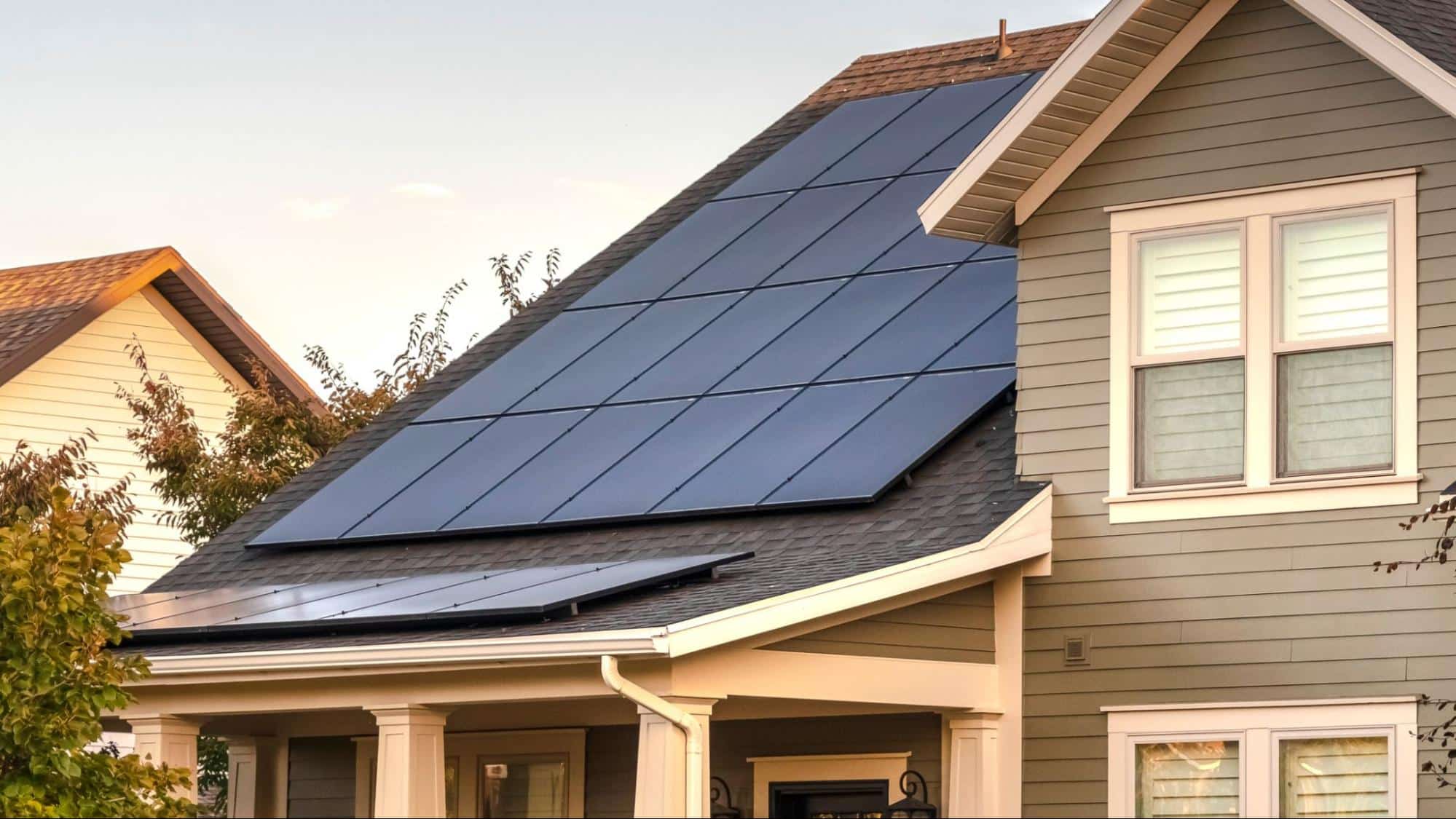If you’ve been thinking about going solar, you’ve probably come across terms like “net metering” and “net billing.” Net billing is a financial mechanism that credits solar homeowners for sending extra power back to the utility grid. This can help solar homeowners continue to save money on electric bills. While both net billing and net metering are ways to help homeowners save on their energy bills, net billing is quickly becoming the new standard in key solar areas — such as California and Arizona.
What is Net Billing?
Net billing is a system that compensates homeowners with solar energy systems for the excess power they produce and send to the grid. Under net billing, you’re paid for the extra energy, but usually at a lower rate than what you pay for electricity from the grid. This rate is often the wholesale rate—the price utilities pay for electricity, which is typically lower than what homeowners are charged.
Many American homeowners may have heard about selling excess electricity back to the utility grid — net billing is a system that allows solar owners to do just that. However, unlike net metering, which typically pays solar users the full retail rate for any extra power they generate, net billing often compensates at a lower rate for the energy you export.
Key Components of Net Billing
Net billing uses two different rates. First, there’s the retail rate, which is what you pay for the electricity you use from the grid. Second, there’s a lower rate for the extra solar energy your system sends back to the grid. This lower rate is often based on how much money the utility saves by not having to produce that energy or on a fixed value for solar power.
Some net billing programs also use Time-of-Use (TOU) rates. This means the rate you earn for your extra solar energy can change depending on the time of day. For example, energy exported during peak hours might be worth more than energy sent to the grid at night.
Net billing systems keep track of both the energy you use from the grid and the energy your solar panels send back. This helps make sure your savings are calculated correctly.
How Net Billing Differs from Net Metering
Net Metering:
- Full retail value: Homeowners get credited at the full retail rate for any extra solar energy they send to the grid.
- Rollover credits: Surplus energy credits often carry over month to month, helping homeowners save for future use.
- Easy to understand: The process is simple and straightforward for homeowners.
- Criticism: Some utilities argue that it doesn’t cover the costs of maintaining the grid.
Net Billing:
- Reduced rate for excess energy: Homeowners are usually paid a lower rate for the extra solar energy they export to the grid.
- Monthly credit settlement: Credits are often settled on a monthly basis instead of rolling over long-term.
- More complex: Net billing can be more complicated but is seen as a better reflection of actual energy costs.
- Addresses utility concerns: It helps utilities balance the costs of maintaining the grid, reducing the risk of cost-shifting to non-solar customers.
How Does Net Billing Work?
Net billing might sound complex, but is a fairly simple billing mechanism for solar homeowners. Here’s a simple breakdown of how net billing works:
- First, your solar panels produce electricity and your home uses that energy right away. This reduces the amount of electricity you need to buy from the grid at the usual retail price.
- If you produce more energy than you use, the extra power is sent back to the grid. For that, you get a credit, but it’s usually at a lower rate than what you pay for electricity from the grid.
- When your solar panels aren’t producing enough power, you still get electricity from the grid and you pay the normal retail rate for that.
At the end of each month, your utility company looks at how much energy you used and how much you sent back to the grid. They charge you for the electricity you took from the grid and they give you credits for the energy you sent back — though the credit is at a lower rate.
Implications for Solar System Owners
The switch to net billing might have a substantial influence on solar adoption.
- Financial returns: While net billing compensation for excess electricity may be less than net metering policies — net billing offers a financial return for solar homeowners and can shorten payback periods.
- System sizing considerations: It is critical to correctly scale solar systems to meet family consumption patterns, as oversizing may not be helpful.
- Energy storage adoption: Battery systems become increasingly appealing since they allow users to store excess energy for later consumption rather than exporting at reduced prices.

Does net billing shorten solar payback periods for homeowners?
While net billing rewards solar homeowners for excess energy sent to the utility grid — it’s impact on solar payback periods is modest. Net billing typically does not shorten payback periods for homeowners compared to older net metering systems. In fact, it can often extend the payback period. Here’s why:
- Lower Export Credit Rate: Under net billing, the excess energy that homeowners send to the grid is compensated at a lower rate, often the utility’s wholesale or avoided cost rate, which is typically less than the full retail rate that was offered under net metering. This reduced rate means homeowners receive less credit for the energy they export, which can slow down the return on investment.
- Focus on Self-Consumption: Net billing encourages homeowners to use more of their solar energy on-site, rather than exporting it. This can benefit those who are able to adjust their energy use to maximize self-consumption, but overall, it reduces the value of exported energy, which can extend the time it takes to recoup the upfront cost of the solar system.
That said, adding battery storage to store excess energy for later use can help shorten the payback period, since homeowners can avoid buying grid electricity at the higher retail rate during non-solar hours.
Regional Variations in Net Billing Policies
Net billing solutions differ greatly among locations.
- California’s Net Billing Tariff (NEM 3.0) includes intricate hourly and seasonal fluctuations in export rates, which reflect system demands and wholesale energy costs.
- New York: The Value of Distributed Energy Resources (VDER) tariff determines export rates based on location, timing and grid value.
- Arizona: Arizona’s net billing policy credits residential solar customers for excess energy sent to the grid at an avoided cost rate — which is lower than the retail rate, with rates varying by utility.
- Maine: The Net Energy Billing kWh Credit Program works like traditional net metering by crediting excess energy production to future bills. However, any unused kilowatt-hour credits expire after 12 months and systems up to 5 MW are eligible.

Things to Think About Before Going Solar
If you’re thinking about installing solar panels in a place with net billing, there are a few important things to keep in mind.
First, look at how much energy you typically use. This can help you choose the right solar system size to get the most savings. You might also want to think about adding a battery storage system. Batteries can store extra solar power for later use and they can even keep your lights on during power outages.
When picking the size of your solar system, be careful not to go too big. With net billing, having a large system might not save you as much money as it would with net metering. Also, it’s a good idea to stay updated on local rules, since net billing policies can change. Knowing your utility company’s guidelines will help you make smart choices.
Finally, think about energy efficiency and smart home technology. Using less energy overall makes your solar system work even better. Plus, smart home systems can help you track and manage your energy use, so you get the most out of your solar power.
Find the Right Solar For Your Place
Choosing the right solar system can feel overwhelming, Enact Solar simplifies the solar journey for homeowners. Our state-of-the-art software makes it easy for homeowners to get a custom solar proposal based on their specific energy needs and location. By using your most recent utility bill and address, Enact’s energy advisors can quickly design a solar system tailored to you — helping you maximize your savings under net billing.
Whether you’re looking to reduce your energy costs or increase self-consumption with solar, Enact Solar provides accurate, fast and personalized solutions to make going solar simple and effective. We provide transparent pricing with no hidden fees — and give our customers choice in financing and hardware options.
If you’re ready to make the switch to solar savings, schedule a free consultation today and receive a custom solar proposal for your home—no strings attached. Let us help you find the perfect solar solution for your needs.


